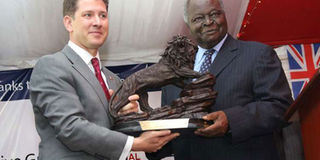Kenya to ‘act’ on reports British spied on Kibaki and Raila

Former President Mwai Kibaki with British High Commissioner to Kenya Christian Turner during celebrations to mark Queen Elizabeth’s birthday at Dr Turner’s residence in Muthaiga. The UK used to spy on the President and his close advisors. PHOTO | FILE | NATION MEDIA GROUP
What you need to know:
- French newspaper Le Monde and an investigative journalism website The Intercept have mentioned Mr Kibaki “and his strategic advisers” among the 20 African presidents and prime ministers the British Government Communications Headquarters was spying on.
- At the time of the intercepts, Angola was suffering from a crash in commodity prices, and US Secretary of State Hillary Clinton visited Luanda to boost strategic co-operation between the two countries.
The Kenyan government is taking seriously reports that British intelligence agents spied on President Mwai Kibaki and Prime Minister Raila Odinga, including intercepting their communication, and will release a statement after reviewing the information.
French newspaper Le Monde and an investigative journalism website The Intercept have mentioned Mr Kibaki “and his strategic advisers” among the 20 African presidents and prime ministers the British Government Communications Headquarters (GCHQ) was spying on.
Government spokesman Eric Kiraithe said there was no immediate comment but the reports were being looked into.
“Our experts including the Foreign Affairs ministry will review the revelations before the government can comment. Right now the government cannot comment. The government will issue a comprehensive statement once the review has been done,” said Mr Kiraithe.
This came as a senior official in the Kibaki administration, who spoke to the Nation in confidence, said State House and the Kenyan intelligence agents were “aware” of the secret British surveillance and took “necessary steps” to counter it.
“We had some ties with them by Kenya being a major trading partner but when Kenya turned east (to China), the British had to be worried,” the associate said.
The story which was published by the two outlets said GCHQ’s main targets were heads of state and prime ministers.
“Although the UK was Kenya’s main trade partner, in March 2009 the British secret services intercepted communications by President Mwai Kibaki and his closest strategic advisers, as well as eavesdropping on Prime Minister Raila Odinga.
They followed the same approach in Angola, Africa’s largest oil producer, which has been governed by President José Eduardo Dos Santos since 1979. The intercept reports show that Luanda’s presidential palace was under surveillance.
BUSINESS FIGURES MONITORED
At the time of the intercepts, Angola was suffering from a crash in commodity prices, and US Secretary of State Hillary Clinton visited Luanda to boost strategic co-operation between the two countries.
Great Britain provided information to the United States to ensure the latter retained its stranglehold on the region,” Le Monde reported. According to the report, other targets included Nigeria’s President Umaru Yar’Adua and his private secretary; Ghana’s President John Kufuor and Sierra Leone’s leader Ernest Koroma.
“Prominent business figures were also monitored, such as Nigerian billionaire Tony Elumelu, regarded as one of Africa’s richest and most influential men, and Chris Kirubi, a wealthy Kenyan businessman and radio-station owner who was described by Forbes in 2011 as the country’s ‘most flamboyant tycoon’,” said the report.
On Saturday, Mr Kirubi, who had just landed in London, told the Sunday Nation: “You have seen that this has appeared in well-respected media outlets. It just shows that everybody is under watch because of technology.”
The reports emanate from documents that fugitive former Central Intelligence Agency contractor Edward Snowden released. Mr Snowden is wanted by the American government to face charges but is currently holed up in Russia.
The close associate of Mr Kibaki’s said that the discovery of the surveillance soured trade relations with the British. He also alleged it was part of a wider conspiracy.
“The debacle of 2007/2008 (post-election violence) by people who wanted to remove Mzee Kibaki from power was also a major precipitant of the surveillance,” the associate claimed.





